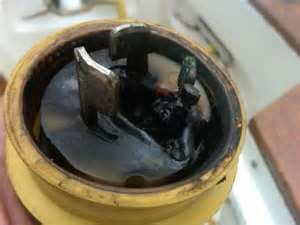Electrical Fire Prevention
Tips from our Dockmaster Ray:

• Always use a surge protector
• Know that a basic heater will use at least 15 amps
• Be aware of what you have running
• Don’t have everything on at the same time
• Store your cord properly – make sure it is not in the water
The best ways to avoid an electrical fire from happening is simple maintenance and a little common sense. Electrical connections should be checked regularly. A loose connection exposes
plugs, outlets and wires to the environment, leading to corrosion, shock hazards, resistance heating, and fires. Butane Stove Safety Butane stoves are a great way to cook, however, certain safety hazards must be addressed. The butane used to light the stove is extremely flammable and hazardous, and users are urged to follow strict safety guidelines to lessen their chances of getting injured.
• Make sure to have proper ventilation
• Store stove and fuel canisters separately – out of direct sunlight and not in the vicinity of open flames. It’s a good idea to place in storage tanks on deck
• Use the appropriate tank size – using a tank too large could possibly overload the pressure valves
• Only use butane stoves that have a safety shut off switch that will turn off the stove if the pressure becomes too high or the stove too hot
A 30amp/120volt circuit requires a 10 gauge or larger shore power cord. A 50amp/208volt circuit requires a 6 gauge or larger shore power cord. Cord must be marine type, twist locking with no pig tails or extension cords. Avoid using extension cords on your boat. Instead, use high quality UL-listed plug strips with a circuit breaker and on/off switch. Double check your electrical system and be sure to use Over Currant and Ground Fault Interruption protected circuits and equipment.
Clean Water – Sewage, MSDs and Pumpout
From boatus.com
Onboard sewage management is not a fun thing to think about, but it is a necessary part of your boat’s systems. Over the last few years, there has been significant attention in the boating press about onboard heads, marine sanitation devices, portable toilets, and the availability of onshore pumpout stations. Here’s a quick overview of the issues, as well as the laws relating to this subject.
Why Should I Care?
No one wants to think about settling down in the cockpit after putting the anchor down and glancing out on the water to see floating toilet paper go by. However, if boaters follow existing laws, this won’t occur. You can help take care of our harbors and other waters by following the law and making sure that your boat’s Marine Sanitation Device (MSD) is working.
The Law:
Federal law says that untreated sewage (even if it’s been dosed with a deodorant product) can NOT be discharged in U.S. waters within 3 miles of shore. This means the sewage from a portable toilet or a Type III holding tank can not be discharged unless you are in the ocean more than 3 miles offshore. You are not required to have a toilet/head on your boat. (In fact, many people choose a portable toilet on their boat.) However, if you do have an installed toilet on your boat, you must have a USCG certified MSD
Type I, II, or III holding tank attached to that toilet. Federal law states that if you have a holding tank for untreated waste with a “Y” valve, it must be secured in the closed position while operating in U.S. waters. To adequately secure the device you should remove the valve handle or use a non-releasable wire tie or padlock.
What Can I Do?
Understand the Basics of Boat Pumpout. When tied up to a dock, use onshore facilities. Encourage guests to take advantage of the onshore restrooms before you set out for a day trip. If your boat has a head, equip it with a USCG approved MSD Type, I, II, or III. Regularly maintain your MSD and the attached plumbing and install the best hose you can afford to reduce odors.
Use Grand Marina’s pump out facility which is free to use and available 24/7 for our tenants. Or call any of our approved pumpout vendors. Give us a call for information. Use enzyme deodorizers for holding tanks and portable toilets.
Don’t be afraid to talk about the issue. Talk your friends and fellow boaters about how to pumpout.
Obey the law – keep untreated sewage out of all coastal and inland waters.

